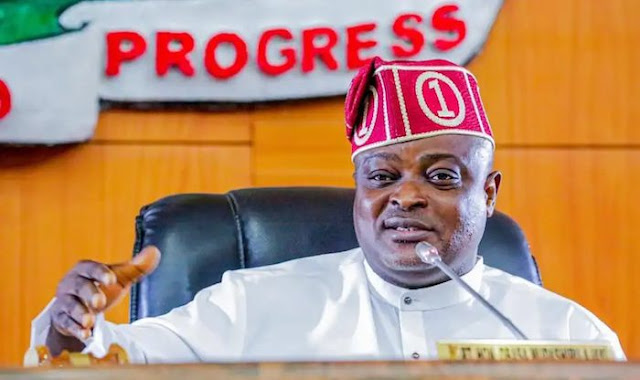In a powerful address delivered on Thursday at the Lateef Jakande Auditorium within the premises of the Lagos State House of Assembly, the Speaker, Rt. Hon. Mudashiru Ajayi Obasa, issued a stern directive to the chairmen of the state’s 20 Local Governments (LGs) and 37 Local Council Development Areas (LCDAs). Speaking at a summit organized to foster dialogue and collaboration between the state legislature and local government leaders, Obasa emphasized that the survival and relevance of council administrations hinge on their ability to prioritize grassroots development and deliver tangible benefits to their constituents. Failure to do so, he warned, could consign them to political irrelevance.
The summit, attended by council chairmen, councillors, and other key stakeholders, was a platform for the Speaker to underscore the critical role of local governments as the tier of governance closest to the people. Obasa’s message was clear: the mandate of local government leaders is derived from the electorate, and their performance will be judged by the extent to which they address the needs of their communities. “The most important thing to us is the people because your mandate is from them. How do we serve them? We keep saying that our votes are dwindling. Who are the closest to the people? It is the local governments,” he stated, setting the tone for a discourse centered on accountability, service delivery, and collaboration.
The Assembly’s Oversight Role and Legislative Framework
Rt. Hon. Obasa highlighted the pivotal role of the Lagos State House of Assembly in shaping the operational framework of local governments. Through its legislative powers, the Assembly has established key institutions such as the Lagos State Independent Electoral Commission (LASIEC), which oversees local government elections, and the Office of the Auditor-General, which ensures financial accountability at the local level. Additionally, the Assembly has enacted laws that define the statutory structures for councillors, outlining their roles and responsibilities in local governance.
The Speaker emphasized that the relationship between the Assembly and local governments is not adversarial but collaborative. “The House is ready to work with the local governments. We strongly believe that we are one and that we are members of the same family, which is why we must work together. We are not going to witch-hunt any local government. We are here to encourage you,” Obasa reassured the council chairmen. This collaborative spirit, he noted, is essential for achieving the shared goal of improving the lives of Lagosians.
However, Obasa did not shy away from addressing lapses in local government administration. Drawing from his own experience as a former councillor, he criticized some chairmen for prioritizing personal gain over public service. “If our votes are dwindling, we should blame the local governments’ chairmen. Don’t just say you will spend eight years and go just like that without achieving anything. It is when you serve the people that you will benefit. Don’t just go there and say you only want to make money,” he admonished, urging council leaders to focus on impactful projects that resonate with their communities.
A Call for Inclusive and Transparent Governance
A significant portion of Obasa’s address focused on the need for council chairmen to foster inclusive governance by maintaining strong working relationships with their councillors, deputies, and community-based organizations. He stressed that councillors are not mere subordinates but partners in governance who deserve respect and collaboration. “Your councillors are your partners. They are not your subjects or subordinates. You must accord them respect, and they must also respect you,” he said, advocating for a harmonious working environment at the local level.
Obasa also urged chairmen to engage actively with Community Development Committees (CDCs) and Community Development Associations (CDAs), which serve as critical links between local governments and grassroots communities. These organizations, he noted, play a vital role in identifying community needs, mobilizing resources, and ensuring that development projects align with the priorities of residents. By working closely with CDCs and CDAs, chairmen can enhance the effectiveness of their administrations and build trust among their constituents.
To further strengthen local governance, Obasa announced plans for Assembly-sponsored seminars aimed at equipping councillors with a deeper understanding of their roles and responsibilities. These capacity-building initiatives, he explained, would be facilitated by experts and funded by the local governments themselves. “We will organize seminars for the councillors so that they would have a better understanding of what they are doing. The chairmen will pay for the seminars. We will get the people that will facilitate the seminars based on what we have in the publication,” he stated. This move underscores the Assembly’s commitment to enhancing the competence of local government officials and ensuring that they are well-prepared to deliver on their mandates.
Prioritizing Development Projects and Public Welfare
The Speaker challenged council chairmen to undertake development projects that directly address the needs of their communities. He emphasized the importance of infrastructure development, particularly in the areas of road construction, healthcare, and recreational facilities. “Each local government can do one, two, three, or four roads in a year, and that will be much. We should let the people know what we are doing. We must do enough publicity for the people to see what we are doing,” he said, highlighting the need for transparency and accountability in project implementation.
Obasa also called for the establishment of poverty alleviation schemes to address the socio-economic challenges facing many Lagosians. He urged chairmen to invest in healthcare delivery by ensuring that primary health centers are functional and accessible to residents. Additionally, he advocated for the creation of recreation parks and sports centers, which he described as essential for promoting youth development and community engagement. “Ensure you have a park within your first year in office. You should also have sports centers. How many football stars or athletes have you produced in your area?” he questioned, challenging chairmen to think beyond routine administrative duties and focus on initiatives that inspire and empower their constituents.
The Speaker’s emphasis on sports and recreation reflects a broader vision of leveraging local government resources to nurture talent and promote healthy lifestyles. By investing in sports infrastructure, local governments can create opportunities for young people to develop their skills, potentially producing the next generation of athletes and community leaders. Such initiatives, Obasa argued, would not only enhance the quality of life in local communities but also strengthen the political goodwill of council chairmen.
The Broader Context: Challenges Facing Local Governments in Nigeria
Obasa’s address comes at a time when local government administration in Nigeria is facing significant challenges, including limited autonomy, inadequate funding, and allegations of mismanagement. Despite being the tier of government closest to the people, local governments across the country often struggle to deliver basic services due to bureaucratic bottlenecks and interference from state governments. In Lagos, the creation of 37 LCDAs in addition to the 20 constitutionally recognized LGs has been a subject of debate, with critics arguing that the proliferation of councils has strained resources and complicated governance structures.
However, Lagos State has often been cited as a model for local government administration in Nigeria, thanks to its innovative policies and robust revenue generation mechanisms. The state’s ability to fund its LCDAs and implement development projects has set it apart from other states, where local governments are heavily dependent on federal allocations. Obasa’s call for council chairmen to prioritize grassroots development aligns with Lagos’ reputation as a pacesetter in governance and underscores the need for local leaders to justify the resources allocated to them.
The Speaker’s remarks also reflect a growing concern about voter apathy and declining political participation in Nigeria. By linking dwindling voter turnout to the performance of local governments, Obasa highlighted the critical role of council chairmen in restoring public confidence in the democratic process. When local governments fail to deliver tangible benefits, citizens may become disillusioned, leading to lower engagement in elections and governance. Obasa’s message, therefore, serves as both a warning and a call to action for council leaders to bridge the gap between government and the people.
Response from Council Leaders
In response to the Speaker’s address, Hon. Sesan Olowa, the Chairman of Ibeju-Lekki Local Government and leader of Conference 57—a platform representing Lagos’ local government chairmen—pledged to redouble efforts toward grassroots development. “We will continue to improve on the development of the local councils, adding that we would keep doing our best for the people,” Olowa assured. His remarks signal a commitment to aligning with the Assembly’s vision of responsive and accountable local governance.
Olowa’s pledge is particularly significant given the strategic importance of Ibeju-Lekki, which has emerged as a hub for industrial and real estate development in Lagos. The local government is home to major projects such as the Lekki Free Trade Zone and the Dangote Refinery, making it a critical player in the state’s economic growth. By committing to grassroots development, Olowa and his counterparts signal their readiness to balance large-scale economic projects with community-focused initiatives that directly benefit residents.
Implications for Lagos and Beyond
Rt. Hon. Obasa’s address has far-reaching implications for local governance in Lagos and Nigeria as a whole. By emphasizing the need for accountability, collaboration, and tangible results, the Speaker has set a high standard for council chairmen and other local government officials. His call for inclusive governance, capacity building, and investment in community infrastructure reflects a forward-thinking approach to addressing the challenges facing local governments in a rapidly urbanizing state like Lagos.
Moreover, the Speaker’s remarks underscore the interconnectedness of the different tiers of government in Nigeria. While local governments are often seen as the weakest link in the country’s federal structure, Obasa’s address highlights their potential to drive transformative change at the grassroots level. By working closely with the state legislature and leveraging the resources available to them, local governments can become engines of development, addressing issues such as poverty, unemployment, and inadequate infrastructure.
The Assembly’s commitment to organizing seminars for councillors is a step in the right direction, as it addresses the capacity gaps that often hinder effective local governance. By equipping councillors with the knowledge and skills needed to perform their duties, the Assembly is laying the foundation for a more competent and responsive local government system. This initiative could serve as a model for other states in Nigeria, where local government officials often lack the training and resources needed to govern effectively.
Conclusion
Rt. Hon. Mudashiru Obasa’s address to the council chairmen of Lagos State is a clarion call for a renewed focus on grassroots development and accountable governance. By challenging local leaders to prioritize the needs of their communities, engage with stakeholders, and deliver tangible results, the Speaker has set the stage for a new era of local governance in Lagos. His emphasis on collaboration, transparency, and capacity building reflects a deep understanding of the challenges and opportunities facing local governments in Nigeria.
As Lagos continues to lead the way in innovative governance, the success of Obasa’s vision will depend on the willingness of council chairmen to embrace their responsibilities and work tirelessly for the benefit of their constituents. With the Assembly’s support and the commitment of local leaders, Lagos’ local governments have the potential to become models of excellence, delivering services and opportunities that transform the lives of residents and strengthen the state’s democratic fabric.






